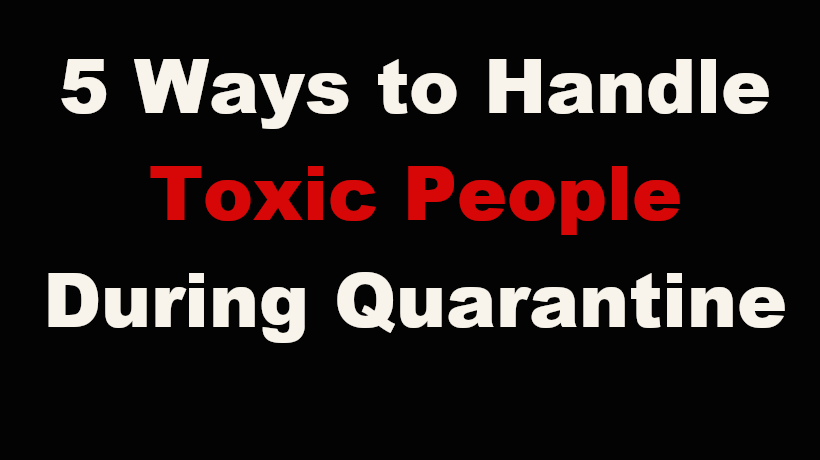If you live with a family member, partner, or roommate, the coronavirus quarantine is all about being able to coexist with someone. This involves meeting your needs and all of their needs and anxieties. You will likely have disagreements in the best of cases. But, if the other person or people you live with are toxic to deal with, this is outside of “normal.”
If this is the case, it’s most likely even harder for you. For example, every day that you and the others are in a confined space for an undisclosed amount of time, you deal with triggers and reactions that can cause the relationship to spiral downwards. There is no easy escape from toxic behavior that is often stressful, taxing, and maybe traumatic. Here are 5 tips that can get you through this time.
- Look inward. Handling space with a family member or roommate who is toxic for you requires self-awareness. When you come into conflict with that person, you must think carefully about what you actually want and feel. Then tell them what you need rather than saying something snarky that can create conflict. Let’s imagine you become angry or resentful that this person is leaving their clothing around, dishes in the sink, and hasn’t taken out the trash. Consider that the real issue for you is feeling ignored and unimportant. Express your feelings calmly, using “I” words, instead of starting a fight. This is an opportunity for you to be a well-adjusted adult.
2. Create a structure for your days, and ask for space when you need it. Be intentional about how you spend your time and space. Negotiate how you each divide time and space, how and how often you check in with each other and acknowledge that always being together can be difficult. Make plans to get together for periods of entertainment and discuss some boundaries that are good for both of you.
3. Go for positivity between you and your family member, partner, or roommate. What can you do if the toxic person triggers your reactions, and their behavior is making you feel crazy, turning into a conflict in the home. Think of five moments of trust, understanding, or compassion for every stinging rebuke. For example, recall a time you’ve had between you that was sweet, helpful, or empathetic. Let that memory calm the urge to nail him or her. If you have the choice to be right or kind, choose kindness. Negative encounters are remembered much longer and have more intensity between you. Emotions can run hot. Try deliberately looking for the positives and let the little stuff slide.
4. Leave the room and set up some enjoyable entertainment for yourself. When toxicity is at play, this suggestion isn’t an indulgence – it’s a requirement! Switch things up. Sometimes a simple distraction is just what you need. Leave the room. Dye your hair. Take up a fitness routine like doing sit-ups, or paint, learn a new board game or read that book you’ve been thinking about reading. After you feel better, you can invite that other person to join you, suggest a creative or intellectual activity.
5. Be realistic about another’s reactions and behavior towards you. While you are reading about how to handle your quarantine, practicing meditation, working out, and eating right, don’t make the mistake of assuming that the other person wants to do the same. The toxic person you are living with may find it impossible to listen to or embrace your good advice. Don’t try to persuade this person to use what works for you. He or she may not take your help as a loving act, nor behave or react in the same way you would. It’s a reflection on them, not you! Recognize and appreciate their emotional space in that moment. Don’t react by taking it personally, but see their reaction in the moment for what it is.
If you are a victim of abuse, facing an indefinite quarantine under the same roof might be the catalyst for a move-out. Victims in relationships where violence is occurring or escalating might view fleeing the home as the safest option under the circumstances. But where do you go? The National Domestic Violence Hotline website is filled with resources and tips. It links to further information that helps victims stay safe. They have a hotline for victims and survivors that are staffed around the clock. They invite those in need of assistance or support to contact them at 1-800-799-7233



